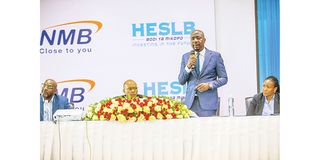NMB Bank, HESLB partner to simplify loans disbursements to students

NMB’s Chief of Retail Banking, Filbert Mponzi speaks in Dar es Salaam on March 13 during a stakeholders’ working session organised by the Higher Education Students’ Loans Board. PHOTO | |THE CITIZEN CORRESPONDENT
What you need to know:
- NMB Bank’s Chief Retail Banking Filbert Mponzi urged students in higher learning institutions to open up bank accounts with the lender adding that the bank’s accounts offer many advantages including instant loans ranging from Sh1,000 to Sh500,000
Dar es Salaam. NMB Bank has integrated its core banking system with the Higher Education Students’ Loans Board (HESLB) in a deliberate move to simplify loans disbursements to students in higher learning institutions.
NMB Bank’s Chief Retail Banking Filbert Mponzi told a forum in Dar es Salaam on March 13 that through the integration, loans were now being disbursed to students more quickly and conveniently.
Organized by HESLB, the forum brought together various education stakeholders under the theme Investing in the Future.
Mr Mponzi urged students in higher learning institutions to open up bank accounts with the lender adding that the bank’s accounts offer many advantages including instant loans ranging from Sh1,000 to Sh500,000.
Students can request loans ranging from Sh200,000 to Sh10 million at an interest rate of only 9 percent.
“The education sector is among our key priorities. To underline our commitment to supporting higher learning, we last year set aside Sh200 billion loans for students in higher learning institutions following close discussions with the Ministry of Education and Vocational Training,” Mponzi said.
On his part the HESLB executive director, Dr Bill Kiwia, said the aim of the forum was to receive feedback from different stakeholders involved in the disbursement functionality of his institution.
He said that the board at the moment reaches more than 200,000 needy students but has already drawn plans to reach more students.
He added that this will however depend on the availability of financial resources.
“We are not satisfied by the current situation because the demand is higher than the available resources,” he said. “We are still looking for different alternatives,” he stressed.
He urged beneficiaries of HESLB loans to ensure timely repayments of loans to enable his institution to operate efficiently for the benefit of more needy students.




